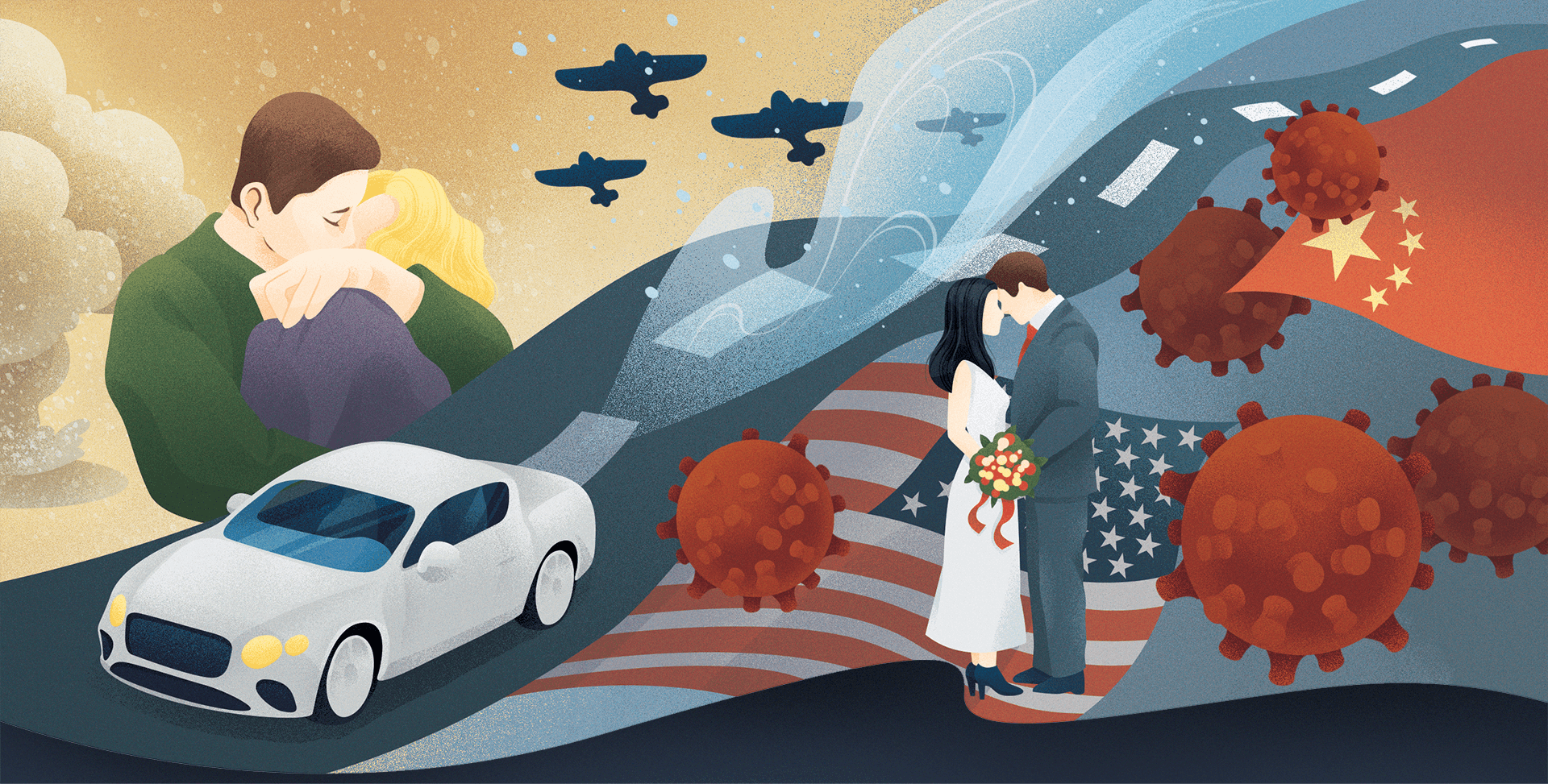Love in the Time of COVID
In 1944, as World War II ground on, German bombs intermittently pounded London, turning large swaths of the majestic city into rubble. Amid the death and destruction, 17-year-old Mira and 23-year-old Rolf, Jewish immigrants who had barely escaped Nazi Germany, married. Only four people bore witness to their joyous union; most of Mira’s and Rolf’s friends and families had perished in the Holocaust or scattered across the globe as refugees.
Call it love during wartime.
More than 75 years later, in Los Angeles, Mira and Rolf’s grandson married his beloved in a hastily arranged ceremony amid a global economic collapse and a pandemic that has killed more than 400,000 Americans and counting. The couple — he a 36-year-old New Yorker, classical pianist and entrepreneur with a Ph.D. in musicology from USC, and she a 27-year-old Chinese national and USC Viterbi alumna, M.S. EM ’18 — believed that if they didn’t move at warp speed toward their nuptials, she risked being deported.
Call it love in the time of COVID-19.
“We didn’t want to lose each other,” she said. (The bride requested anonymity because she has yet to receive her permanent green card.)
Along the way, the couple took an arduous, 400-mile trip in a blizzard to remote Mono County, California, to obtain a marriage license, tied the knot a few days later at his rabbi’s house, and have started their new life together.
In the end, his Holocaust-survivor grandparents had three more witnesses at their wedding than they did.
“Like my grandparents, my wife and I were swept up in a dramatic, pivotal moment in world history,” he said.
They met in 2016 while crossing 37th Place near Vermont Avenue. He said he noticed “a beautiful woman, and I just started talking to her.” Her smarts and charm captivated him immediately. It took a bit longer for her to warm up. When he took her hand during a romantic drive in his sports car along Pacific Coast Highway, she wondered why American men expressed friendship by holding hands. In time, though, his curiosity and intelligence won her over. They became inseparable and talked about marrying, possibly in 2021.
That all changed with the onset of the pandemic in March. As large swaths of the country began shutting down and the stock market plummeted, layoffs skyrocketed. She, happy in her position as a global supply chain analyst at a luxury fashion company, suddenly worried about job security, especially after her boss talked about possible furloughs and salary freezes.
He worried about their future. If she lost her job, her student visa would have allowed her to stay in the U.S. for only a few more months. Unless she could find a similar STEM-related position quickly — unlikely given the economy’s weakness — she would have to return to China.
They decided to marry immediately so she could apply for permanent residency. Unfortunately, by then almost all government offices around California had shut down because of the pandemic. After a frantic day on the phone, he found a county clerk in Mono County in the Sierra Nevadas willing to issue a marriage license. A harrowing eight-hour drive later, much of it through a blizzard, the couple arrived in Bridgeport and spent the night. They picked up the license the following day but spent another night in town because of inclement weather. Rushing home, they married on March 22. The rabbi’s wife served as the sole witness.
Then they had to secure her an extended work permit as she waited for her green card. Only after Sen. Kamala Harris’s office intervened did the government issue her work extension in October. Without it, she would not have been able to work in the U.S. after January 2021.
Since then, his genealogy research business is growing, while she found her dream job at Amazon in June. She partly credits her hands-on USC Viterbi education for her career success. “They kind of give you a taste of the real business world, which I like,” she said.
Their marriage has flourished. He pays heed to advice that “Papa” Rolf once gave him: Put your spouse’s needs before you own. “For the sake of shalom bayit, Hebrew for a peaceful home, I will take the blame,” he said, only half-jokingly.
It worked for his grandparents, who eventually settled in New York City. Their union lasted nearly 75 years, ending only in 2019 when Rolf died at 97.
Call it real love.




